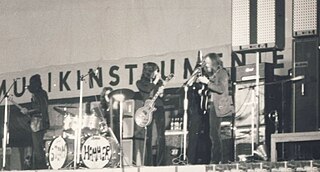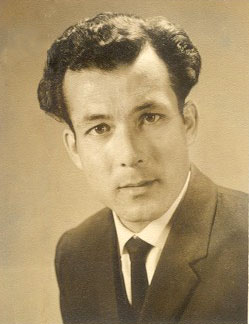Bhangra is a type of non-traditional music of Punjab originating in the Majha area of Punjab. It is a type of upbeat popular music associated with the Punjabi diaspora in India. The style has its origins in the folk music of Punjab as well as western pop music of the 1970s and 1980s. Prior to this musical fusion, Bhangra existed only as a dance form in the native Punjab. This Punjabi music was unique in that it was not traditional nor did it seek any authenticity. While the traditional folk music of Punjab has a set of melodies that are used by various singers, Bhangra was a form of strict "band culture" in that new melodies were composed for each song. Therefore, the musicians were as important as the singers.

Music of Nepal refers to the various musical genres played and listened to in Nepal. With more than fifty ethnic groups in Nepal, the country's music is highly diverse. Genres like Tamang Selo, Chyabrung, Dohori, Adhunik Geet, Bhajan, Filmi music, Ghazal, Classical music, songs and Ratna music are widely played and popular, but many other less common genres are yet to be cataloged. Western musical genres like Rock, Metal, Hip-Hop, Rap, R&B also regularly feature on the Nepalese music charts. Most of the country's musical bands are based in the Kathmandu valley. Musical genres from Tibet and India have greatly influenced Nepalese music.
The music of Sri Lanka has its roots in five primary influences: ancient folk rituals, Hindu religious traditions, Buddhist religious traditions, the legacy of European colonisation, and the commercial and historical influence of nearby Indian culture—specifically, Kollywood cinema and Bollywood cinema.

Jeremy Webster "Fred" Frith is an English multi-instrumentalist, composer, and improviser.

Nepalese rock refers to rock music culture of Nepal and the Nepali-speaking regions in India like Sikkim and northern West Bengal, and some parts of Bhutan and Burma.

Indian folk music is diverse because of India's enormous cultural diversity. It is sung in various languages and dialects throughout the length and breadth of this vast nation and exported to different parts of the world owing to migration.

Steamhammer is an English rock band from Worthing, England, that was formed in 1968 by vocalist Kieran White, guitarists Martin Quittenton and Martin Pugh, bassist Steve Davy, and drummer Michael Rushton.

1974 AD is a Nepali rock band, formed in Kathmandu, Nepal in the early 1990s. They experiment with various genres of music including Nepali folk, ragas, rock, funk, blues and jazz. 1974 AD are amongst the most successful recording artists in Nepal. Most of their albums are ranked amongst the top-ten best-selling albums according to Hits FM of Nepal. In 2000, their concert, 'Rock Yatra,' was watched by more than 60,000 people, the largest attendance for a concert in Nepal.

Shiva Shankar Manandhar was a singer, music composer of Nepali songs and the chief actor in the first Nepali movie, Aama. For nearly a half century beginning from 1950 to late 1990, his name has probably been mentioned more often in books, journals, lectures and conversations about Nepalese music than any other musicians.

The Nepali Sarangi is a Nepali folk instrument. It is a chordophone played by bowing. Traditionally in Nepal, the Sarangi was only played by people of Gandarbha or Gaine caste, who sing narrative tales and folk song, however, in present days, its popularity extends beyond the Gandharba community and is widely used and played by other caste members as well. It has also garnered much interest in other music genres, such as Nepali rock and film music. While the Sarangi has become the quintessential Gandharba instrument, while its counterpart, the arbajo, which is a plucked lute, has fallen into obscurity.

Kutumba is an instrumental folk Nepalese band. It only uses Nepalese traditional musical instruments such as bamboo flutes, sarangi, madal, tungna, dhol, jhyamta, arbajoo, dhime, dhyangro, damphu, khin, and singing bowl. The band recorded a single for season 6 of Coke Studio Pakistan, which aired in late 2013. They have collaborated with other Nepali artists such as Navneet Aditya Waiba, Satya Aditya Waiba, Albatross, Hari Maharjan, 1974 AD and Astha Tamang Maskey. They competed in the AI Song Contest 2021 alongside Diwas, Chepang, and Hari Maharjan with the song "Dreaming of Nepal", placing 17th with 15 points.

Elevation is the third solo album by guitarist and composer Lawson Rollins. Rollins co-produced the album with Persian-American musician and producer Shahin Shahida and multi-platinum producer Dominic Camardella. The cast of 20 different musicians includes the Grammy winning violinist Charlie Bisharat, avante-garde electric guitarist Buckethead, Nepali sarangi player Kirin Nepali, Iranian vocalist Parsa Hassandokht, Nepali flute player Ruban Kumar Shrestha, Iranian santourist Pejman Eckhtiari, and Nepali tabla player Raju Maharjan. Associate producer William Aura of 3rd Force recorded the Nepali musicians in Kathmandu, Nepal. The Iranian musicians were recorded in Iran by co-producer Shahin Shahida.

Mongolian Heart is a folk musical band of Nepal. Mongolian Heart debuted in 1992 and it has received several awards including the Music Nepal Gold Medal in 1999, Kantipur FM Awards, Hits FM Award and Image Awards. While individual band members have performed around the world extensively, the band has travelled to Dubai, Australia, Hong Kong and other countries. The band is currently celebrating its 25th anniversary by performing all over the world.
Resham Firiri is a traditional Nepali folk song, composed by Buddhi Pariyar and originally performed by Sunder Shrestha and Dwarika Lal Joshi in 1969. Due to sudden rise in popularity, it became one of the most widely known and performed songs in Nepal. It is often played on the sarangi, a native instrument, as street music.

Blackhouse is the seventh studio album by Scottish celtic fusion band Peatbog Faeries, released in May 2015 by the band's label Peatbog Records. After recording their acclaimed album Dust (2011), the band played live for the following few years, during which time fiddler Peter Tickell left the band, to be replaced by Ross Couper. As the band had not recorded an album for some years, they returned to record Blackhouse mainly in a cottage in Kilchoan, Ardnamurchan during 2014, although recording continued into 2015. Their first album with Touper, and their first without a brass section since Welcome to Dun Vegas (2003), Blackhouse was produced by Calum MacLean and displays a very eclectic array of genres, fusing the band's Scottish celtic roots with genres such as jazz, funk, reggae, dance and house.
Kandara Band or Kandara is a musical group from Pokhara, Nepal. The band formed in 1994 and takes its name after the Nepalese word for "a gorge or a cave in the middle of remote hills or mountains".
Night is a new-school folk band from Nepal. The band is known for its use of traditional Nepali instruments in its songs. It aims to reintroduce the traditional instruments of Nepal to the modern generation of Nepali-speaking audience.
Anuprastha is a Nepali rock band. The name Anuprastha (अनुप्रस्थ) is derived from Sanskrit: Anu (अनु) means "music" and Prastha (प्रस्थ) "first". They generally focus their music on the rock genre but combine it with Nepali folk tunes.

Navneet Aditya Waiba is an Indian Nepali-language folk singer and the daughter of the late Hira Devi Waiba, the pioneer of Nepali folk music. Navneet and younger brother Satya Aditya Waiba (producer/manager) are the only artists in the Nepali folk music genre who sing and produce authentic traditional Nepali folk songs without adulteration or modernisation using mostly organic and traditional Nepali music instruments.

Arko Mukherjee, popularly known by his artist name, Arko Mukhaerjee, is an Indian singer, playback singer and an urban folk musician from Calcutta, India. He sings folk songs in various languages including Bengali and Nepali. The singer can sing in more than 20 languages and plays five different instruments. He sings folk music to blues, soul and several tribal music forms from different parts of the world. He researches on the roots of folk and contemporary music by travelling around different parts of the world as Europe, America, Bangladesh and Nepal.













